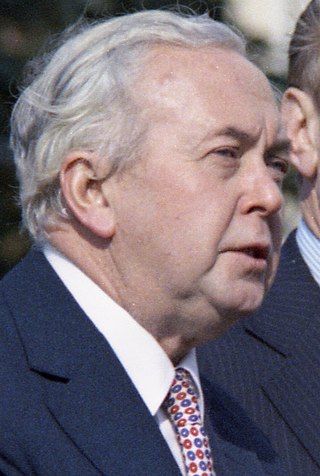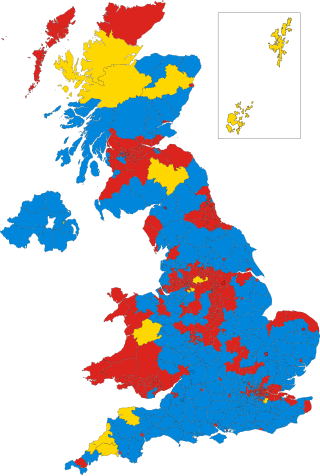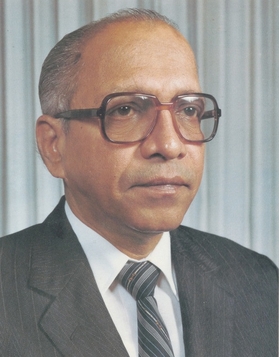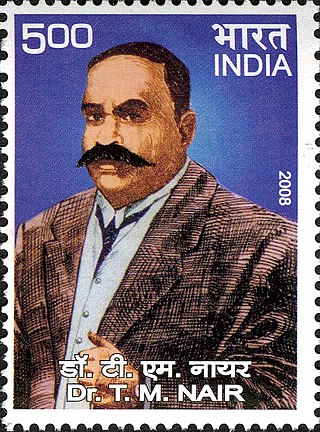
The prime minister of the United Kingdom is the head of government of the United Kingdom. The prime minister advises the sovereign on the exercise of much of the royal prerogative, chairs the Cabinet and selects its ministers. As modern prime ministers hold office by virtue of their ability to command the confidence of the House of Commons, they sit as members of Parliament.

The politics of the United Kingdom functions within a constitutional monarchy where executive power is delegated by legislation and social conventions to a unitary parliamentary democracy. From this a hereditary monarch, currently Charles III, serves as head of state while the Prime Minister of the United Kingdom, currently Rishi Sunak, serves as the elected head of government.

Great Britain, officially the United Kingdom of Great Britain, was a sovereign country in Western Europe from 1707 until 1801. The state was created by the 1706 Treaty of Union and ratified by the Acts of Union 1707, which united the kingdoms of England and Scotland to form a single kingdom encompassing the whole island of Great Britain and its outlying islands, with the exception of the Isle of Man and the Channel Islands. The unitary state was governed by a single parliament at the Palace of Westminster, but distinct legal systems—English law and Scots law—remained in use.

The February 1974 United Kingdom general election was held on Thursday 28 February 1974. The Labour Party, led by Leader of the Opposition and former Prime Minister Harold Wilson, gained 14 seats but was seventeen short of an overall majority. The Conservative Party, led by incumbent Prime Minister Edward Heath, lost 28 seats. That resulted in a hung parliament, the first since 1929. Heath sought a coalition with the Liberals, but the two parties failed to come to an agreement and so Wilson became Prime Minister for a second time, his first with a minority government. Wilson called another early election in September, which was held in October and resulted in a Labour majority. The February election was also the first general election to be held with the United Kingdom as a member state of the European Communities (EC), which was widely known as the "Common Market".

The October 1974 United Kingdom general election took place on Thursday 10 October 1974 to elect 635 members of the British House of Commons. It was the second general election held that year; the first year that two general elections were held in the same year since 1910; and the first time that two general elections were held less than a year apart from each other since the 1923 and 1924 elections, which took place 10 months apart. The election resulted in the Labour Party, led by Prime Minister Harold Wilson, winning a bare majority of three seats. That enabled the remainder of the Labour government to take place, but it saw a gradual loss of its majority.

The 1966 United Kingdom general election was held on Thursday 31 March 1966. The result was a landslide victory for the Labour Party led by incumbent Prime Minister Harold Wilson.
Robert Law McCartney, KC is a Northern Irish barrister and Unionist politician who was the founder and leader of the UK Unionist Party (UKUP) from 1995 to 2008.

The 1918 United Kingdom general election was called immediately after the Armistice with Germany which ended the First World War, and was held on Saturday, 14 December 1918. The governing coalition, under Prime Minister David Lloyd George, sent letters of endorsement to candidates who supported the coalition government. These were nicknamed "Coalition Coupons", and led to the election being known as the "coupon election". The result was a massive landslide in favour of the coalition, comprising primarily the Conservatives and Coalition Liberals, with massive losses for Liberals who were not endorsed. Nearly all the Liberal MPs without coupons were defeated, including party leader H. H. Asquith.

The United Kingdom European Communities membership referendum, also known variously as the Referendum on the European Community (Common Market), the Common Market referendum and EEC membership referendum, took place under the provisions of the Referendum Act 1975 on 5 June 1975 in the United Kingdom to gauge support for the country's continued membership of the three European Communities (EC) – principally the European Economic Community (EEC, the 'Common Market'), the European Atomic Energy Community (Euratom), and the European Coal and Steel Community (ECSC). — which it had joined as a member state two-and-a-half years earlier on 1 January 1973 under the Conservative government of Edward Heath. The Labour Party's manifesto for the October 1974 general election had promised that the people would decide through the ballot box whether to remain in the EC.

Chengara Veetil Devan Nair, also known as C. V. Devan Nair, better known as Devan Nair, was a Singaporean politician and union leader who served as the third president of Singapore from 1981 until his resignation in 1985.
Philip Roy Gallie was a British Conservative Party politician. He served in the British House of Commons as the Member of Parliament (MP) for Ayr from 1992 to 1997, and then as a Member of the Scottish Parliament (MSP) for the South of Scotland region from 1999 to 2007. He also held prominent offices within the Scottish Conservative Party.
Sir Robert Michael Conal McNair-Wilson was a British Conservative Party politician and a Member of Parliament (MP).
Sir Patrick Michael Ernest David McNair-Wilson is a British former Conservative Member of Parliament and consultant.
Shawlands Academy is a state secondary school in the Shawlands area of Glasgow, Scotland.

The leader of the Labour Party is the highest position within the United Kingdom's Labour Party. The current holder of the position is Keir Starmer, who was elected to the position on 4 April 2020, following his victory in the party's leadership election.

Taravath Madhavan Nair was an Indian politician and political activist of the Dravidian Movement from the Madras Presidency. He founded the Justice Party along with Theagaraya Chetty and C. Natesa Mudaliar.

Corraine Wilson is an Alba Party politician who was previously the Scottish National Party (SNP) Member of Parliament (MP) for Ayr, Carrick and Cumnock from 2015 to 2017.

Laura Rose Farris is a British Conservative politician who has been the Member of Parliament (MP) for Newbury since the 2019 general election. Prior to her parliamentary career, she worked as a journalist and later as a barrister. She has been Parliamentary Under-Secretary of State for Victims and Safeguarding since November 2023.

A. G. Mehta was a Ugandan member of parliament, barrister and the eldest son of a prominent Indian industrialist. The Honourable A.G. Mehta was elected as the first Asian-Indian mayor of Uganda's capital Kampala in 1968 and was a close colleague of Uganda's first prime minister Milton Obote; with whom he jointly fought for the country's independence at the Uganda Constitutional Conference in 1961. He is credited with drafting elements of what would become the first Constitution of Uganda.